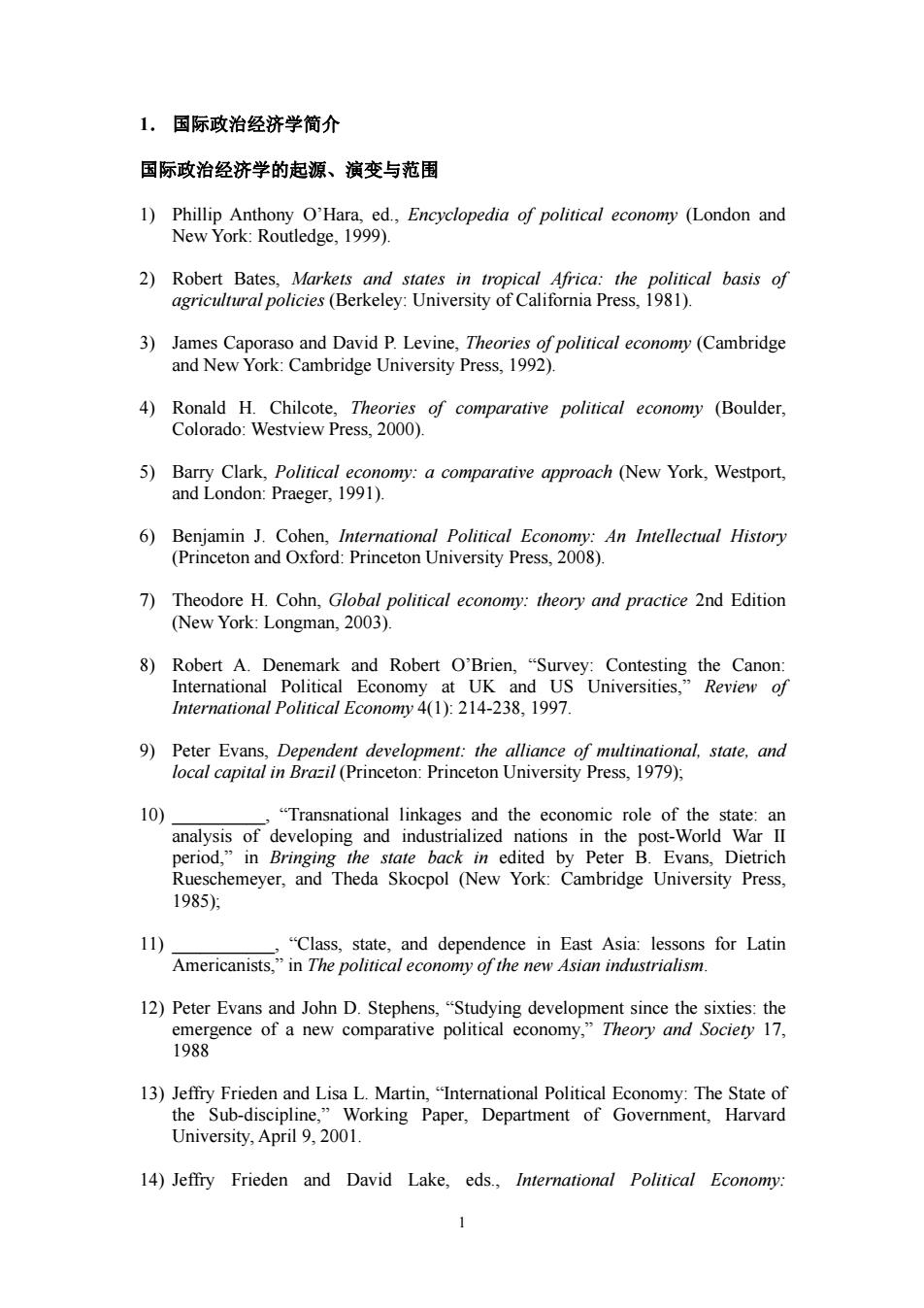
1.国际政治经济学简介 国际政治经济学的起源、演变与范围 1)Phillip Anthony O'Hara,ed.,Encyclopedia of political economy (London and New York:Routledge,1999). 2)Robert Bates,Markets and states in tropical Africa:the political basis of agricultural policies(Berkeley:University of California Press,1981). 3)James Caporaso and David P.Levine,Theories of political economy(Cambridge and New York:Cambridge University Press,1992). 4)Ronald H.Chilcote,Theories of comparative political economy (Boulder, Colorado:Westview Press,2000) 5)Barry Clark,Political economy:a comparative approach (New York,Westport, and London:Praeger,1991). 6)Benjamin J.Cohen,International Political Economy:An Intellectual History (Princeton and Oxford:Princeton University Press,2008). 7)Theodore H.Cohn,Global political economy:theory and practice 2nd Edition (New York:Longman,2003). 8)Robert A.Denemark and Robert O'Brien,"Survey:Contesting the Canon: International Political Economy at UK and US Universities,"Review of International Political Economy 4(1):214-238,1997. 9)Peter Evans,Dependent development:the alliance of multinational,state,and local capital in Brazil (Princeton:Princeton University Press,1979); 10) "Transnational linkages and the economic role of the state:an analysis of developing and industrialized nations in the post-World War II period,"in Bringing the state back in edited by Peter B.Evans,Dietrich Rueschemeyer,and Theda Skocpol (New York:Cambridge University Press, 1985) 11) "Class,state,and dependence in East Asia:lessons for Latin Americanists,"in The political economy of the new Asian industrialism 12)Peter Evans and John D.Stephens,"Studying development since the sixties:the emergence of a new comparative political economy,"Theory and Society 17, 1988 13)Jeffry Frieden and Lisa L.Martin,"International Political Economy:The State of the Sub-discipline,"Working Paper,Department of Government,Harvard University,April 9,2001. 14)Jeffry Frieden and David Lake,eds.,International Political Economy:
1 1. 国际政治经济学简介 国际政治经济学的起源、演变与范围 1) Phillip Anthony O’Hara, ed., Encyclopedia of political economy (London and New York: Routledge, 1999). 2) Robert Bates, Markets and states in tropical Africa: the political basis of agricultural policies (Berkeley: University of California Press, 1981). 3) James Caporaso and David P. Levine, Theories of political economy (Cambridge and New York: Cambridge University Press, 1992). 4) Ronald H. Chilcote, Theories of comparative political economy (Boulder, Colorado: Westview Press, 2000). 5) Barry Clark, Political economy: a comparative approach (New York, Westport, and London: Praeger, 1991). 6) Benjamin J. Cohen, International Political Economy: An Intellectual History (Princeton and Oxford: Princeton University Press, 2008). 7) Theodore H. Cohn, Global political economy: theory and practice 2nd Edition (New York: Longman, 2003). 8) Robert A. Denemark and Robert O’Brien, “Survey: Contesting the Canon: International Political Economy at UK and US Universities,” Review of International Political Economy 4(1): 214-238, 1997. 9) Peter Evans, Dependent development: the alliance of multinational, state, and local capital in Brazil (Princeton: Princeton University Press, 1979); 10) __________, “Transnational linkages and the economic role of the state: an analysis of developing and industrialized nations in the post-World War II period,” in Bringing the state back in edited by Peter B. Evans, Dietrich Rueschemeyer, and Theda Skocpol (New York: Cambridge University Press, 1985); 11) ___________, “Class, state, and dependence in East Asia: lessons for Latin Americanists,” in The political economy of the new Asian industrialism. 12) Peter Evans and John D. Stephens, “Studying development since the sixties: the emergence of a new comparative political economy,” Theory and Society 17, 1988 13) Jeffry Frieden and Lisa L. Martin, “International Political Economy: The State of the Sub-discipline,” Working Paper, Department of Government, Harvard University, April 9, 2001. 14) Jeffry Frieden and David Lake, eds., International Political Economy:
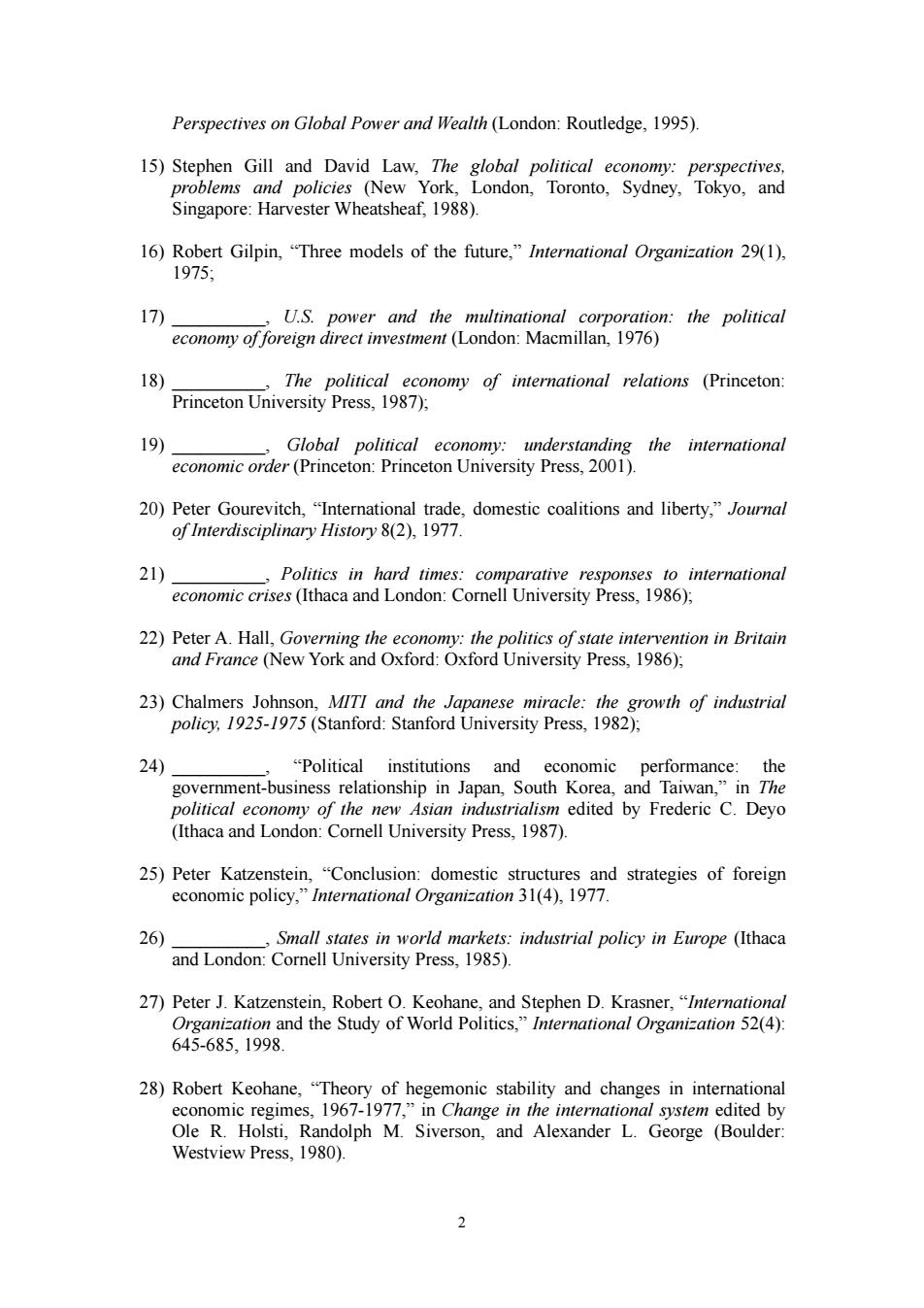
Perspectives on Global Power and Wealth (London:Routledge,1995) 15)Stephen Gill and David Law,The global political economy:perspectives, problems and policies (New York,London,Toronto,Sydney,Tokyo,and Singapore:Harvester Wheatsheaf,1988). 16)Robert Gilpin,"Three models of the future,"International Organization 29(1), 1975; 17) U.S.power and the multinational corporation:the political economy offoreign direct investment (London:Macmillan,1976) 18) The political economy of international relations (Princeton: Princeton University Press,1987); 19) Global political economy:understanding the international economic order (Princeton:Princeton University Press,2001). 20)Peter Gourevitch,"International trade,domestic coalitions and liberty,"Journal of Interdisciplinary History 8(2),1977 21) Politics in hard times:comparative responses to international economic crises (Ithaca and London:Cornell University Press,1986); 22)Peter A.Hall,Governing the economy:the politics of state intervention in Britain and France (New York and Oxford:Oxford University Press,1986): 23)Chalmers Johnson,MITI and the Japanese miracle:the growth of industrial policy,1925-1975(Stanford:Stanford University Press,1982); 24) "Political institutions and economic performance: the government-business relationship in Japan,South Korea,and Taiwan,"in The political economy of the new Asian industrialism edited by Frederic C.Deyo (Ithaca and London:Cornell University Press,1987). 25)Peter Katzenstein,"Conclusion:domestic structures and strategies of foreign economic policy,"International Organization 31(4),1977. 26) Small states in world markets:industrial policy in Europe (Ithaca and London:Cornell University Press,1985). 27)Peter J.Katzenstein,Robert O.Keohane,and Stephen D.Krasner,"International Organization and the Study of World Politics,"International Organization 52(4): 645-685,1998. 28)Robert Keohane,"Theory of hegemonic stability and changes in international economic regimes,1967-1977,"in Change in the international system edited by Ole R.Holsti,Randolph M.Siverson,and Alexander L.George (Boulder: Westview Press,1980). 2
2 Perspectives on Global Power and Wealth (London: Routledge, 1995). 15) Stephen Gill and David Law, The global political economy: perspectives, problems and policies (New York, London, Toronto, Sydney, Tokyo, and Singapore: Harvester Wheatsheaf, 1988). 16) Robert Gilpin, “Three models of the future,” International Organization 29(1), 1975; 17) __________, U.S. power and the multinational corporation: the political economy of foreign direct investment (London: Macmillan, 1976) 18) __________, The political economy of international relations (Princeton: Princeton University Press, 1987); 19) __________, Global political economy: understanding the international economic order (Princeton: Princeton University Press, 2001). 20) Peter Gourevitch, “International trade, domestic coalitions and liberty,” Journal of Interdisciplinary History 8(2), 1977. 21) __________, Politics in hard times: comparative responses to international economic crises (Ithaca and London: Cornell University Press, 1986); 22) Peter A. Hall, Governing the economy: the politics of state intervention in Britain and France (New York and Oxford: Oxford University Press, 1986); 23) Chalmers Johnson, MITI and the Japanese miracle: the growth of industrial policy, 1925-1975 (Stanford: Stanford University Press, 1982); 24) __________, “Political institutions and economic performance: the government-business relationship in Japan, South Korea, and Taiwan,” in The political economy of the new Asian industrialism edited by Frederic C. Deyo (Ithaca and London: Cornell University Press, 1987). 25) Peter Katzenstein, “Conclusion: domestic structures and strategies of foreign economic policy,” International Organization 31(4), 1977. 26) __________, Small states in world markets: industrial policy in Europe (Ithaca and London: Cornell University Press, 1985). 27) Peter J. Katzenstein, Robert O. Keohane, and Stephen D. Krasner, “International Organization and the Study of World Politics,” International Organization 52(4): 645-685, 1998. 28) Robert Keohane, “Theory of hegemonic stability and changes in international economic regimes, 1967-1977,” in Change in the international system edited by Ole R. Holsti, Randolph M. Siverson, and Alexander L. George (Boulder: Westview Press, 1980)

29) After Hegemony:cooperation and discord in the world political economy(Princeton:Princeton University Press,1984). 30)Robert Keohane and Joseph Nye,Power and interdependence:world politics in transition(Boston and Toronto:Little,Brown and Company,1977). 31)Jan-Erik Lane and Svante Ersson,Comparative political economy:a developmental approach (London and Washington:Pinter,1990 and 1997). 32)Margaret Levi,Of rule and revenue (Berkeley:University of California Press, 1988). 33)Michael Mann,The sources of social power I:a history of power from the beginning to A.D.1760(New York:Cambridge University Press,1986). 34) States,war and capitalism (Cambridge (Mass.)and Oxford: Blackwell,1988). 35) The sources of social power II:the rise of classes and nation-states, 1760-1914(New York:Cambridge University Press,1993). 36)Phillip Anthony O'Hara,ed.Global Political Economy and the Wealth of Nations: Performance,institutions,problems and policies (London and New York: Routledge,2004). 37)Mancur Olson,The rise and decline of nations:economic growth,stagflation,and social rigidities (New Heaven:Yale University Press,1982). 38)Ronen Palan ed.,Global Political Economy:Contemporary Theories (London and New York:Routledge,2000). 39)Herman M.Schwartz,States versus markets:the emergence of a global economy (New York:St.Martin's Press,2000); 40)Susan Strange,States and Markets:An Introduction to International Political Economy (London:Pinter,1988). 41)Joan Edelman Spero,The Politics of International Economic Relations (New York:St.Martin's,1977). 42) The Politics of International Economic Relations (London:Unwin Hyman,1990). 43)Charles Tilly,ed.,The Formation of national states in Western Europe(Princeton: Princeton University Press,1975). 44) Coercion,capital,and European states,AD 990-1992 (Cambridge (Mass.)and Oxford:Blackwell,1992). 45)程毅、夏安凌、韩玉贵主编,《国际经济政治概论》(面向21世纪课程教材, 3
3 29) __________, After Hegemony: cooperation and discord in the world political economy (Princeton: Princeton University Press, 1984). 30) Robert Keohane and Joseph Nye, Power and interdependence: world politics in transition (Boston and Toronto: Little, Brown and Company, 1977). 31) Jan-Erik Lane and Svante Ersson, Comparative political economy: a developmental approach (London and Washington: Pinter, 1990 and 1997). 32) Margaret Levi, Of rule and revenue (Berkeley: University of California Press, 1988). 33) Michael Mann, The sources of social power I: a history of power from the beginning to A.D. 1760 (New York: Cambridge University Press, 1986). 34) __________, States, war and capitalism (Cambridge (Mass.) and Oxford: Blackwell, 1988). 35) __________, The sources of social power II: the rise of classes and nation-states, 1760-1914 (New York: Cambridge University Press, 1993). 36) Phillip Anthony O’Hara, ed. Global Political Economy and the Wealth of Nations: Performance, institutions, problems and policies (London and New York: Routledge, 2004). 37) Mancur Olson, The rise and decline of nations: economic growth, stagflation, and social rigidities (New Heaven: Yale University Press, 1982). 38) Ronen Palan ed., Global Political Economy: Contemporary Theories (London and New York: Routledge, 2000). 39) Herman M. Schwartz, States versus markets: the emergence of a global economy (New York: St. Martin’s Press, 2000); 40) Susan Strange, States and Markets: An Introduction to International Political Economy (London: Pinter, 1988). 41) Joan Edelman Spero, The Politics of International Economic Relations (New York: St. Martin's, 1977). 42) __________, The Politics of International Economic Relations (London: Unwin Hyman, 1990). 43) Charles Tilly, ed., The Formation of national states in Western Europe (Princeton: Princeton University Press, 1975). 44) __________, Coercion, capital, and European states, AD 990-1992 (Cambridge (Mass.) and Oxford: Blackwell, 1992). 45) 程毅、夏安凌、韩玉贵 主编,《国际经济政治概论》(面向 21 世纪课程教材

北京:高等教育出版社,2001): 46)樊勇明著,《西方国际政治经济学》(上海:上海人民出版社,2001): 47)李滨著,《国际政治经济学:全球视野下的市场与国家》(南京:南京大学 出版社,2005)等。 48)彭澎著,《国际政治经济学》(北京:社会科学文献出版社,2001): 49)宋新宁、陈岳著,《国际政治经济学概论》(21世纪国际政治系列教材,北 京:中国人民大学出版社,1999): 50)王正毅、张岩贵著,《国际政治经济学:理论范式与现实经验研究》(北京: 商务印书馆,2003): 51)朱天飚,《比较政治经济学》(北京:北京大学出版社,2006年) 52)朱文莉著,《国际政治经济学》(北京大学国际关系学院系列教材,北京: 北京大学出版社,2004): 国际政治经济学的理论范式 53)Rawi Abdelal,National Purpose in the World Economy:Post-Soviet States in Comparative Perspective(Ithaca and London:Cornell University Press,2001); 54)Amin,Unequal Development:An Essay on the Social Formations of Peripheral Capitalism translated by Brian Pearce (New York:Monthly Review Press,1976); 55)Fernando Henrique Cardoso and Enzo Faletto,Dependency and Development in Latin America translated by Marjory Mattingly Urquidi (Berkeley,Los Angeles and London:University of California Press,1979) 56)Robert W.Cox,"Social forces,states and world orders:beyond international relations theory",in Neorealism and its critics edited by Robert Keohane (New York:Columbia University Press,1986). 57) Production,Power and World Order:Social Forces in the Making of History (New York:Columbia University Press,1987); 58)Francesco Duina,The Social Construction of Free Trade:The European Union, NAFT4,and Mercosur (Princeton:Princeton University Press,2006); 59)Andre Gunder Frank,"The Development of Underdevelopment,"Monthly Review18(4):17-31,1966, 60)Gill and Law,The global political economy:perspectives,problems and policies 61)Marieke de Goede,"Beyond Economism in International Political Economy
4 北京:高等教育出版社,2001); 46) 樊勇明 著,《西方国际政治经济学》(上海:上海人民出版社,2001); 47) 李滨 著,《国际政治经济学:全球视野下的市场与国家》(南京:南京大学 出版社,2005)等。 48) 彭澎 著,《国际政治经济学》(北京:社会科学文献出版社,2001); 49) 宋新宁、陈岳 著,《国际政治经济学概论》(21 世纪国际政治系列教材,北 京:中国人民大学出版社,1999); 50) 王正毅、张岩贵 著,《国际政治经济学:理论范式与现实经验研究》(北京: 商务印书馆,2003); 51) 朱天飚,《比较政治经济学》(北京:北京大学出版社,2006 年) 52) 朱文莉 著,《国际政治经济学》(北京大学国际关系学院系列教材,北京: 北京大学出版社,2004); 国际政治经济学的理论范式 53) Rawi Abdelal, National Purpose in the World Economy: Post-Soviet States in Comparative Perspective (Ithaca and London: Cornell University Press, 2001); 54) Amin, Unequal Development: An Essay on the Social Formations of Peripheral Capitalism translated by Brian Pearce (New York: Monthly Review Press, 1976); 55) Fernando Henrique Cardoso and Enzo Faletto, Dependency and Development in Latin America translated by Marjory Mattingly Urquidi (Berkeley, Los Angeles and London: University of California Press, 1979) 56) Robert W. Cox, “Social forces, states and world orders: beyond international relations theory”, in Neorealism and its critics edited by Robert Keohane (New York: Columbia University Press, 1986). 57) __________, Production, Power and World Order: Social Forces in the Making of History (New York: Columbia University Press, 1987); 58) Francesco Duina, The Social Construction of Free Trade: The European Union, NAFTA, and Mercosur (Princeton: Princeton University Press, 2006); 59) Andre Gunder Frank, “The Development of Underdevelopment,” Monthly Review 18(4): 17-31, 1966; 60) Gill and Law, The global political economy: perspectives, problems and policies 61) Marieke de Goede, “Beyond Economism in International Political Economy
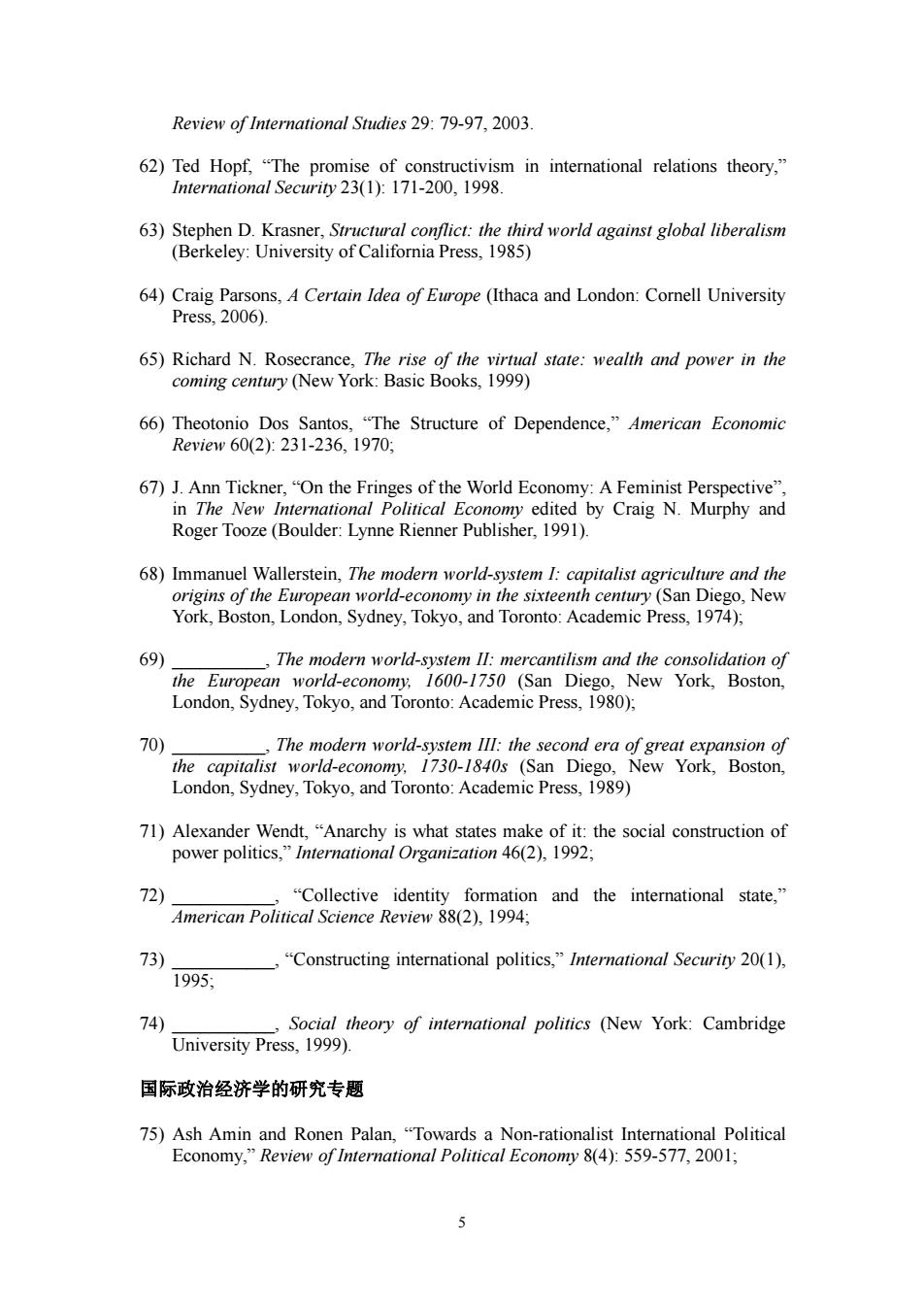
Review of International Studies 29:79-97,2003. 62)Ted Hopf,"The promise of constructivism in international relations theory," International Security 23(1):171-200,1998. 63)Stephen D.Krasner,Structural conflict:the third world against global liberalism (Berkeley:University of California Press,1985) 64)Craig Parsons,A Certain Idea of Europe (Ithaca and London:Cornell University Press,2006). 65)Richard N.Rosecrance,The rise of the virtual state:wealth and power in the coming century (New York:Basic Books,1999) 66)Theotonio Dos Santos,"The Structure of Dependence,"American Economic Review60(2):231-236,1970; 67)J.Ann Tickner,"On the Fringes of the World Economy:A Feminist Perspective" in The New International Political Economy edited by Craig N.Murphy and Roger Tooze(Boulder:Lynne Rienner Publisher,1991). 68)Immanuel Wallerstein,The modern world-system I:capitalist agriculture and the origins of the European world-economy in the sixteenth century (San Diego,New York,Boston,London,Sydney,Tokyo,and Toronto:Academic Press,1974); 69) The modern world-system II:mercantilism and the consolidation of the European world-economy,1600-1750 (San Diego,New York,Boston, London,Sydney,Tokyo,and Toronto:Academic Press,1980); 70) The modern world-system III:the second era of great expansion of the capitalist world-economy,1730-1840s (San Diego,New York,Boston, London,Sydney,Tokyo,and Toronto:Academic Press,1989) 71)Alexander Wendt,"Anarchy is what states make of it:the social construction of power politics,"International Organization 46(2),1992; 72) "Collective identity formation and the international state," American Political Science Review 88(2),1994; 73) "Constructing international politics,"International Security 20(1), 1995, 74) Social theory of international politics (New York:Cambridge University Press,1999). 国际政治经济学的研究专题 75)Ash Amin and Ronen Palan,"Towards a Non-rationalist International Political Economy,"Review of International Political Economy 8(4):559-577,2001; 5
5 Review of International Studies 29: 79-97, 2003. 62) Ted Hopf, “The promise of constructivism in international relations theory,” International Security 23(1): 171-200, 1998. 63) Stephen D. Krasner, Structural conflict: the third world against global liberalism (Berkeley: University of California Press, 1985) 64) Craig Parsons, A Certain Idea of Europe (Ithaca and London: Cornell University Press, 2006). 65) Richard N. Rosecrance, The rise of the virtual state: wealth and power in the coming century (New York: Basic Books, 1999) 66) Theotonio Dos Santos, “The Structure of Dependence,” American Economic Review 60(2): 231-236, 1970; 67) J. Ann Tickner, “On the Fringes of the World Economy: A Feminist Perspective”, in The New International Political Economy edited by Craig N. Murphy and Roger Tooze (Boulder: Lynne Rienner Publisher, 1991). 68) Immanuel Wallerstein, The modern world-system I: capitalist agriculture and the origins of the European world-economy in the sixteenth century (San Diego, New York, Boston, London, Sydney, Tokyo, and Toronto: Academic Press, 1974); 69) __________, The modern world-system II: mercantilism and the consolidation of the European world-economy, 1600-1750 (San Diego, New York, Boston, London, Sydney, Tokyo, and Toronto: Academic Press, 1980); 70) __________, The modern world-system III: the second era of great expansion of the capitalist world-economy, 1730-1840s (San Diego, New York, Boston, London, Sydney, Tokyo, and Toronto: Academic Press, 1989) 71) Alexander Wendt, “Anarchy is what states make of it: the social construction of power politics,” International Organization 46(2), 1992; 72) ___________, “Collective identity formation and the international state,” American Political Science Review 88(2), 1994; 73) ___________, “Constructing international politics,” International Security 20(1), 1995; 74) ___________, Social theory of international politics (New York: Cambridge University Press, 1999). 国际政治经济学的研究专题 75) Ash Amin and Ronen Palan, “Towards a Non-rationalist International Political Economy,” Review of International Political Economy 8(4): 559-577, 2001;

76)Louise Amoore,Richard Dodgson,Randall D.Germain,Barry K.Gills,Paul Langley and Iain Watson,"Paths to a Historicized International Political Economy,"Review of International Political Economy 7(1):53-71,2000; 77)Peter Andreas,"Illicit International Political Economy:The Clandestine Side of Globalization,"Review of International Political Economy 11(3):641-652,2004. 78)David A.Baldwin,Economic statecraft (Princeton:Princeton University Press, 1985): 79)Robert E.Baldwin and David A.Kay,"International trade and international relations,"International Organization 29(1):99-131,1975 80)John Baylis and Steve Smith,eds.The Globalization of World Politics:An Introduction to International Politics Third Edition (Oxford and New York: Oxford University Press,2005),p.676. 81)Emile Benoit,Defense and economic growth in developing countries (Toronto and London:Lexington Books,1973); 82)Benjamin J.Cohen,The geography of money (Ithaca and London:Cornell University Press,1998); 83)Benjamin J.Cohen,"The political economy of international trade,"International Organization442):261-281,1990; 84)Robin Cohen and Zig Layton-Henry,eds.The politics of migration (Cheltenham and Northampton:E.Elgar,1997); 85)Theodore H.Cohn,Global political economy:theory and practice (New York: Longman,2000),p.40 and p.318. 86)Denemark and O'Brien,"Survey:Contesting the Canon:International Political Economy at UK and US Universities". 87)Mette Eilstrup-Sangiovanni,"Transnational Networks and New Security Threats,"Cambridge Review of International Affairs 18(1),2005; 88)Lorraine Elliott,The global politics of the environment Second Edition (Basingstoke:Palgrave Macmillan,2004) 89)Walter Enders and Todd Sandler,The political economy of terrorism(Cambridge: Cambridge University Press,2006) 90)Robert Gilpin,"Economic interdependence and national security in historical perspective",in Economic issues and national security edited by Klaus Knorr and Frank N.Trager(Lawrence:University Press of Kansas,1977); 91)Robert Gilpin,The challenge of global capitalism (Princeton:Princeton University Press,2000);
6 76) Louise Amoore, Richard Dodgson, Randall D. Germain, Barry K. Gills, Paul Langley and Iain Watson, “Paths to a Historicized International Political Economy,” Review of International Political Economy 7(1): 53-71, 2000; 77) Peter Andreas, “Illicit International Political Economy: The Clandestine Side of Globalization,” Review of International Political Economy 11(3): 641-652, 2004. 78) David A. Baldwin, Economic statecraft (Princeton: Princeton University Press, 1985); 79) Robert E. Baldwin and David A. Kay, “International trade and international relations,” International Organization 29(1): 99-131, 1975 80) John Baylis and Steve Smith, eds. The Globalization of World Politics: An Introduction to International Politics Third Edition (Oxford and New York: Oxford University Press, 2005), p.676. 81) Emile Benoit, Defense and economic growth in developing countries (Toronto and London: Lexington Books, 1973); 82) Benjamin J. Cohen, The geography of money (Ithaca and London: Cornell University Press, 1998); 83) Benjamin J. Cohen, “The political economy of international trade,” International Organization 44(2): 261-281, 1990; 84) Robin Cohen and Zig Layton-Henry, eds. The politics of migration (Cheltenham and Northampton: E. Elgar, 1997); 85) Theodore H. Cohn, Global political economy: theory and practice (New York: Longman, 2000), p.40 and p.318. 86) Denemark and O’Brien, “Survey: Contesting the Canon: International Political Economy at UK and US Universities”. 87) Mette Eilstrup-Sangiovanni, “Transnational Networks and New Security Threats,” Cambridge Review of International Af airs 18(1), 2005; 88) Lorraine Elliott, The global politics of the environment Second Edition (Basingstoke: Palgrave Macmillan, 2004) 89) Walter Enders and Todd Sandler, The political economy of terrorism (Cambridge: Cambridge University Press, 2006) 90) Robert Gilpin, “Economic interdependence and national security in historical perspective”, in Economic issues and national security edited by Klaus Knorr and Frank N. Trager (Lawrence: University Press of Kansas, 1977); 91) Robert Gilpin, The challenge of global capitalism (Princeton: Princeton University Press, 2000);
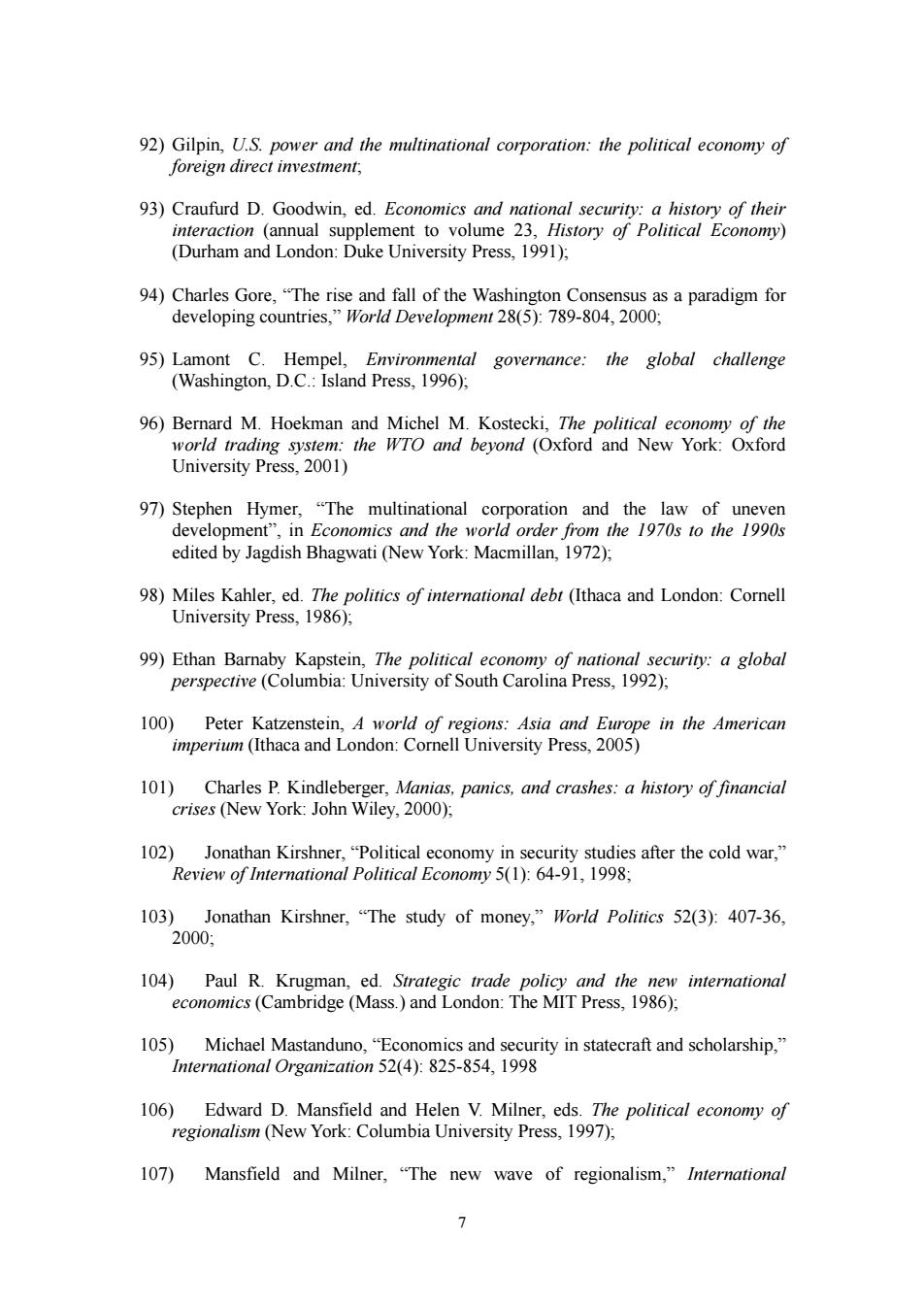
92)Gilpin,U.S.power and the multinational corporation:the political economy of foreign direct investment, 93)Craufurd D.Goodwin,ed.Economics and national security:a history of their interaction (annual supplement to volume 23,History of Political Economy) (Durham and London:Duke University Press,1991); 94)Charles Gore,"The rise and fall of the Washington Consensus as a paradigm for developing countries,"World Development 28(5):789-804,2000: 95)Lamont C.Hempel,Environmental governance:the global challenge (Washington,D.C.:Island Press,1996); 96)Bernard M.Hoekman and Michel M.Kostecki,The political economy of the world trading system:the WTo and beyond (Oxford and New York:Oxford University Press,2001) 97)Stephen Hymer,"The multinational corporation and the law of uneven development",in Economics and the world order from the 1970s to the 1990s edited by Jagdish Bhagwati (New York:Macmillan,1972); 98)Miles Kahler,ed.The politics of international debt (Ithaca and London:Cornell University Press,1986); 99)Ethan Barnaby Kapstein,The political economy of national security:a global perspective (Columbia:University of South Carolina Press,1992): 100)Peter Katzenstein,A world of regions:Asia and Europe in the American imperium (Ithaca and London:Cornell University Press,2005) 101)Charles P.Kindleberger,Manias,panics,and crashes:a history of financial crises (New York:John Wiley,2000); 102)Jonathan Kirshner,"Political economy in security studies after the cold war," Review of International Political Economy 5(1):64-91,1998; 103)Jonathan Kirshner,"The study of money,"World Politics 52(3):407-36, 2000; 104)Paul R.Krugman,ed.Strategic trade policy and the new international economics(Cambridge(Mass.)and London:The MIT Press,1986); 105)Michael Mastanduno,"Economics and security in statecraft and scholarship," International Organization 52(4):825-854,1998 106)Edward D.Mansfield and Helen V.Milner,eds.The political economy of regionalism (New York:Columbia University Press,1997); 107) Mansfield and Milner,"The new wave of regionalism,"International
7 92) Gilpin, U.S. power and the multinational corporation: the political economy of foreign direct investment; 93) Craufurd D. Goodwin, ed. Economics and national security: a history of their interaction (annual supplement to volume 23, History of Political Economy) (Durham and London: Duke University Press, 1991); 94) Charles Gore, “The rise and fall of the Washington Consensus as a paradigm for developing countries,” World Development 28(5): 789-804, 2000; 95) Lamont C. Hempel, Environmental governance: the global challenge (Washington, D.C.: Island Press, 1996); 96) Bernard M. Hoekman and Michel M. Kostecki, The political economy of the world trading system: the WTO and beyond (Oxford and New York: Oxford University Press, 2001) 97) Stephen Hymer, “The multinational corporation and the law of uneven development”, in Economics and the world order from the 1970s to the 1990s edited by Jagdish Bhagwati (New York: Macmillan, 1972); 98) Miles Kahler, ed. The politics of international debt (Ithaca and London: Cornell University Press, 1986); 99) Ethan Barnaby Kapstein, The political economy of national security: a global perspective (Columbia: University of South Carolina Press, 1992); 100) Peter Katzenstein, A world of regions: Asia and Europe in the American imperium (Ithaca and London: Cornell University Press, 2005) 101) Charles P. Kindleberger, Manias, panics, and crashes: a history of financial crises (New York: John Wiley, 2000); 102) Jonathan Kirshner, “Political economy in security studies after the cold war,” Review of International Political Economy 5(1): 64-91, 1998; 103) Jonathan Kirshner, “The study of money,” World Politics 52(3): 407-36, 2000; 104) Paul R. Krugman, ed. Strategic trade policy and the new international economics (Cambridge (Mass.) and London: The MIT Press, 1986); 105) Michael Mastanduno, “Economics and security in statecraft and scholarship,” International Organization 52(4): 825-854, 1998 106) Edward D. Mansfield and Helen V. Milner, eds. The political economy of regionalism (New York: Columbia University Press, 1997); 107) Mansfield and Milner, “The new wave of regionalism,” International

Organization53(3):589-627,1999; 108)Weiner Myron,The Global Migration Crisis:Challenge to States and to Human Rights (New York:HarperCollins,1996); 109)Gregory W.Noble and John Ravenhill,eds.The Asian financial crisis and the architecture of global finance (Cambridge:Cambridge University Press, 2000片: 110)Ben O'Loughlin,"Review Article:Conceptions of Politics and Economics in Post-States and Markets IPE,"Review of International Political Economy 9(2): 416-427,2002; 111)Ziya Oins and Fikret Senses,"Rethinking the Emerging Post-Washington Consensus,"Development and Change 36(2):263-290,2005 112)Theodore Pelagidis and Harry Papasotiriou,"Globalisation or regionalism? States,markets and the structure of international trade,"Review of International Studies28:519-535,2002; 113)Joshua Cooper Ramo,The Beijing Consensus(Paper,London:The Foreign Policy Centre,.2004),见:htp:/fpc.org.uk/fsblob/244.pdf。 114)John Rapley,Understanding development:theory and practice in the third world(Boulder:Lynne Rienner Publishers,1996); 115)J.David Richardson,"The political economy of strategic trade policy," International Organization 44(1):107-135,1990; 116)Dani Rodrik,"Sense and nonsense in the globalization debate,"Foreign Policy107:19-36,1997: 117)Ben Rosamond,"Babylon and On?Globalization and International Political Economy,"Review of International Political Economy 10(4):661-671,2003 118)Gita Sen and Caren Grown,Development,crises and alternative visions: Third World women's perspectives (London:Earthscan,1988); 119)Beth A.Simmons and Zachary Elkins,"The Globalization of Liberalization: Policy Diffusion in the International Political Economy,"American Political Science Review 98(1),2004; 120)Jill Steans,Gender and international relations:an introduction (Cambridge: Polity,1998); 121)Joseph E.Stiglitz,"Capital market liberalization,economic growth,and instability,"World Development 28(6):1075-1086,2000; 122)John Stopford and Susan Strange,Rival states,rival firms:competition for world market shares(Cambridge:Cambridge University Press,1991
8 Organization 53(3): 589-627, 1999; 108) Weiner Myron, The Global Migration Crisis: Challenge to States and to Human Rights (New York: HarperCollins, 1996); 109) Gregory W. Noble and John Ravenhill, eds. The Asian financial crisis and the architecture of global finance (Cambridge: Cambridge University Press, 2000); 110) Ben O’Loughlin, “Review Article: Conceptions of Politics and Economics in Post-States and Markets IPE,” Review of International Political Economy 9(2): 416-427, 2002; 111) Ziya Oins and Fikret Senses, “Rethinking the Emerging Post-Washington Consensus,” Development and Change 36(2): 263-290, 2005 112) Theodore Pelagidis and Harry Papasotiriou, “Globalisation or regionalism? States, markets and the structure of international trade,” Review of International Studies 28: 519-535, 2002; 113) Joshua Cooper Ramo, The Beijing Consensus (Paper, London: The Foreign Policy Centre, 2004),见:http://fpc.org.uk/fsblob/244.pdf。 114) John Rapley, Understanding development: theory and practice in the third world (Boulder: Lynne Rienner Publishers, 1996); 115) J. David Richardson, “The political economy of strategic trade policy,” International Organization 44(1): 107-135, 1990; 116) Dani Rodrik, “Sense and nonsense in the globalization debate,” Foreign Policy 107: 19-36, 1997; 117) Ben Rosamond, “Babylon and On? Globalization and International Political Economy,” Review of International Political Economy 10(4): 661-671, 2003 118) Gita Sen and Caren Grown, Development, crises and alternative visions: Third World women's perspectives (London: Earthscan, 1988); 119) Beth A. Simmons and Zachary Elkins, “The Globalization of Liberalization: Policy Diffusion in the International Political Economy,” American Political Science Review 98(1), 2004; 120) Jill Steans, Gender and international relations: an introduction (Cambridge: Polity, 1998); 121) Joseph E. Stiglitz, “Capital market liberalization, economic growth, and instability,” World Development 28(6): 1075-1086, 2000; 122) John Stopford and Susan Strange, Rival states, rival firms: competition for world market shares (Cambridge: Cambridge University Press, 1991
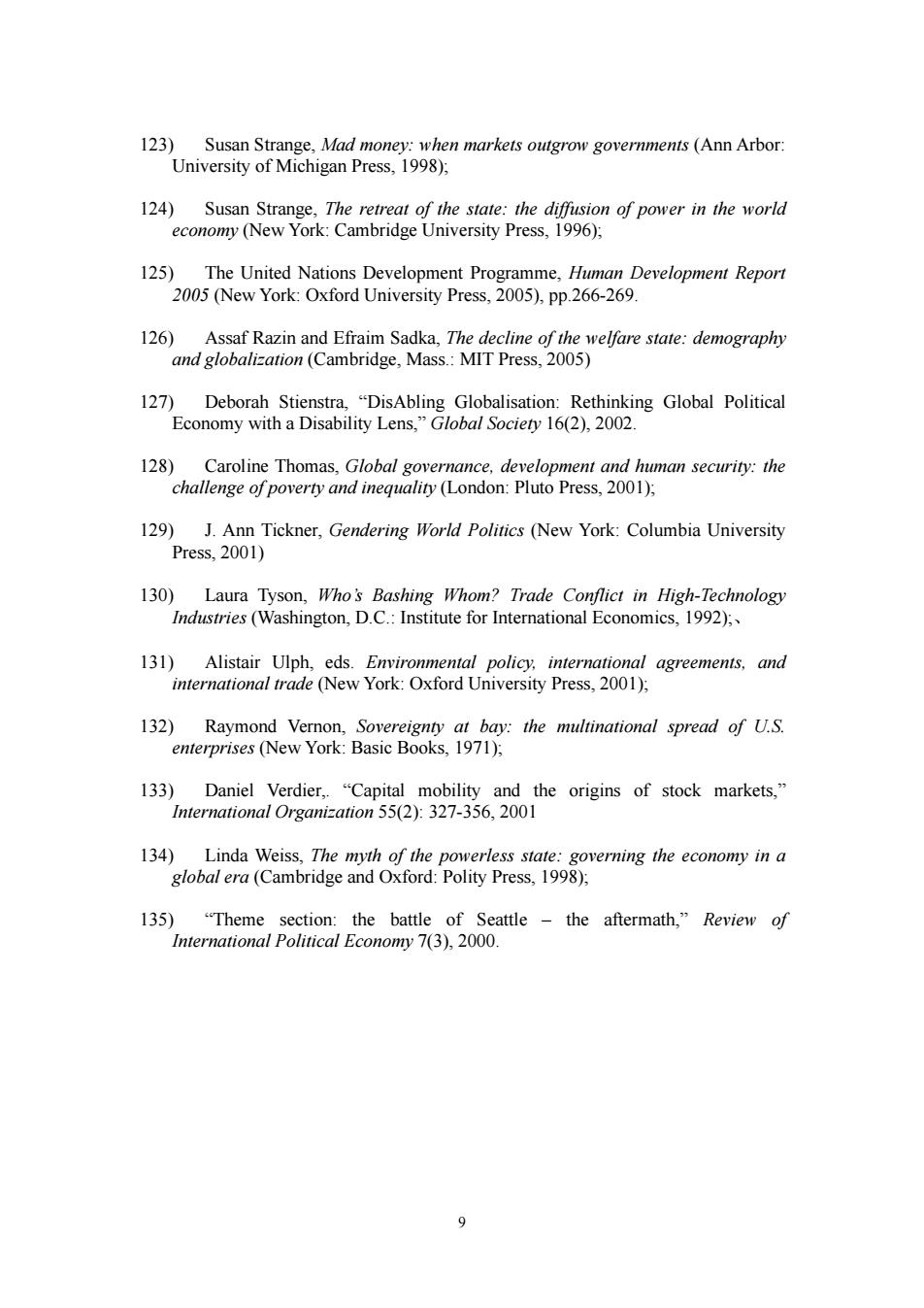
123)Susan Strange,Mad money:when markets outgrow governments(Ann Arbor: University of Michigan Press,1998); 124)Susan Strange,The retreat of the state:the diffusion of power in the world economy (New York:Cambridge University Press,1996); 125)The United Nations Development Programme,Human Development Report 2005(New York:Oxford University Press,2005),pp.266-269. 126)Assaf Razin and Efraim Sadka,The decline of the welfare state:demography and globalization (Cambridge,Mass.:MIT Press,2005) 127)Deborah Stienstra,"DisAbling Globalisation:Rethinking Global Political Economy with a Disability Lens,"Global Society 16(2),2002. 128)Caroline Thomas,Global governance,development and human security:the challenge ofpoverty and inequality (London:Pluto Press,2001); 129)J.Ann Tickner,Gendering World Politics (New York:Columbia University Press,2001) 130)Laura Tyson,Who's Bashing Whom?Trade Conflict in High-Technology Industries(Washington,D.C.:Institute for International Economics,1992); 131)Alistair Ulph,eds.Environmental policy,international agreements,and international trade (New York:Oxford University Press,2001); 132)Raymond Vernon,Sovereignty at bay:the multinational spread of U.S. enterprises (New York:Basic Books,1971); 133)Daniel Verdier,."Capital mobility and the origins of stock markets," International Organization 55(2):327-356,2001 134)Linda Weiss,The myth of the powerless state:governing the economy in a global era (Cambridge and Oxford:Polity Press,1998); 135) "Theme section:the battle of Seattle -the aftermath,"Review of International Political Economy 7(3),2000. 9
9 123) Susan Strange, Mad money: when markets outgrow governments (Ann Arbor: University of Michigan Press, 1998); 124) Susan Strange, The retreat of the state: the dif usion of power in the world economy (New York: Cambridge University Press, 1996); 125) The United Nations Development Programme, Human Development Report 2005 (New York: Oxford University Press, 2005), pp.266-269. 126) Assaf Razin and Efraim Sadka, The decline of the welfare state: demography and globalization (Cambridge, Mass.: MIT Press, 2005) 127) Deborah Stienstra, “DisAbling Globalisation: Rethinking Global Political Economy with a Disability Lens,” Global Society 16(2), 2002. 128) Caroline Thomas, Global governance, development and human security: the challenge of poverty and inequality (London: Pluto Press, 2001); 129) J. Ann Tickner, Gendering World Politics (New York: Columbia University Press, 2001) 130) Laura Tyson, Who’s Bashing Whom? Trade Conflict in High-Technology Industries (Washington, D.C.: Institute for International Economics, 1992);、 131) Alistair Ulph, eds. Environmental policy, international agreements, and international trade (New York: Oxford University Press, 2001); 132) Raymond Vernon, Sovereignty at bay: the multinational spread of U.S. enterprises (New York: Basic Books, 1971); 133) Daniel Verdier,. “Capital mobility and the origins of stock markets,” International Organization 55(2): 327-356, 2001 134) Linda Weiss, The myth of the powerless state: governing the economy in a global era (Cambridge and Oxford: Polity Press, 1998); 135) “Theme section: the battle of Seattle – the aftermath,” Review of International Political Economy 7(3), 2000

2.国际政治经济互动概论 现代国家与现代经济 136)Roland Axtmann,"The state of the state:the model of the modern state and its contemporary transformation,"International Political Science Review 25(3): 259-279,2004,p.260 137)John A.Hall,and G.John Ikenberry,The state (Milton Keynes:Open University Press,1989),p.41. 138)Albert O.Hirschman,"Exit,voice,and the state,"World Politics 31(1): 90-107,1978. 139)Joungwon Alexander Kim,"The politics of predevelopment,"Comparative Politics 5(2),1973,p.3; 140)Paul Kennedy,The rise and fall of the great powers:economic change and military conflict from 1500 to 2000 (London,Sydney,and Wellington:Unwin and Hyman,1988). 141)Michael Mann,States,war and capitalism (Cambridge (Mass.)and Oxford: Blackwell,1988). 142)Jeol S.Migdal,"Studying the state,"in Comparative politics:rationality, culture,and structure edited by Mark Irving Lichbach and Alan S.Zuckerman (Cambridge:Cambridge University Press,1997),p.230. 143)Andreas Osiander,"Before sovereignty:society and politics in ancient regime Europe,"Review of International Studies 27,2001,p.145. 144)Karl Polanyi,The great transformation:the political and economic origins of our time (Boston:Beacon Press,1944). 145)Hendrik Spruyt,"Institutional selection in international relations:state anarchy as order,"International Organization 48(4),1994; 146) The sovereign state and its competitors:an analysis of systems change (Princeton:Princeton University Press,1994). 147)William R.Thompson and Karen Rasler,"War,the military revolution(s) controversy,and army expansion:A test of two explanations of historical influences on European state making,"Comparative Political Studies 32(1), 1999 148)Charles Tilly,"War making and state making as organized crime",in Bringing the state back in edited by Peter B.Evans,Dietrich Rueschemeyer,and Theda Skocpol (New York:Cambridge University Press,1985). 0
10 2.国际政治经济互动概论 现代国家与现代经济 136) Roland Axtmann, “The state of the state: the model of the modern state and its contemporary transformation,” International Political Science Review 25(3): 259-279, 2004, p.260. 137) John A. Hall, and G. John Ikenberry, The state (Milton Keynes: Open University Press, 1989), p.41. 138) Albert O. Hirschman, “Exit, voice, and the state,” World Politics 31(1): 90-107, 1978. 139) Joungwon Alexander Kim, “The politics of predevelopment,” Comparative Politics 5(2), 1973, p.3; 140) Paul Kennedy, The rise and fall of the great powers: economic change and military conflict from 1500 to 2000 (London, Sydney, and Wellington: Unwin and Hyman, 1988). 141) Michael Mann, States, war and capitalism (Cambridge (Mass.) and Oxford: Blackwell, 1988). 142) Jeol S. Migdal, “Studying the state,” in Comparative politics: rationality, culture, and structure edited by Mark Irving Lichbach and Alan S. Zuckerman (Cambridge: Cambridge University Press, 1997), p.230. 143) Andreas Osiander, “Before sovereignty: society and politics in ancient regime Europe,” Review of International Studies 27, 2001, p.145. 144) Karl Polanyi, The great transformation: the political and economic origins of our time (Boston: Beacon Press, 1944). 145) Hendrik Spruyt, “Institutional selection in international relations: state anarchy as order,” International Organization 48(4), 1994; 146) __________, The sovereign state and its competitors: an analysis of systems change (Princeton: Princeton University Press, 1994). 147) William R. Thompson and Karen Rasler, “War, the military revolution(s) controversy, and army expansion: A test of two explanations of historical influences on European state making,” Comparative Political Studies 32(1), 1999. 148) Charles Tilly, “War making and state making as organized crime”, in Bringing the state back in edited by Peter B. Evans, Dietrich Rueschemeyer, and Theda Skocpol (New York: Cambridge University Press, 1985)